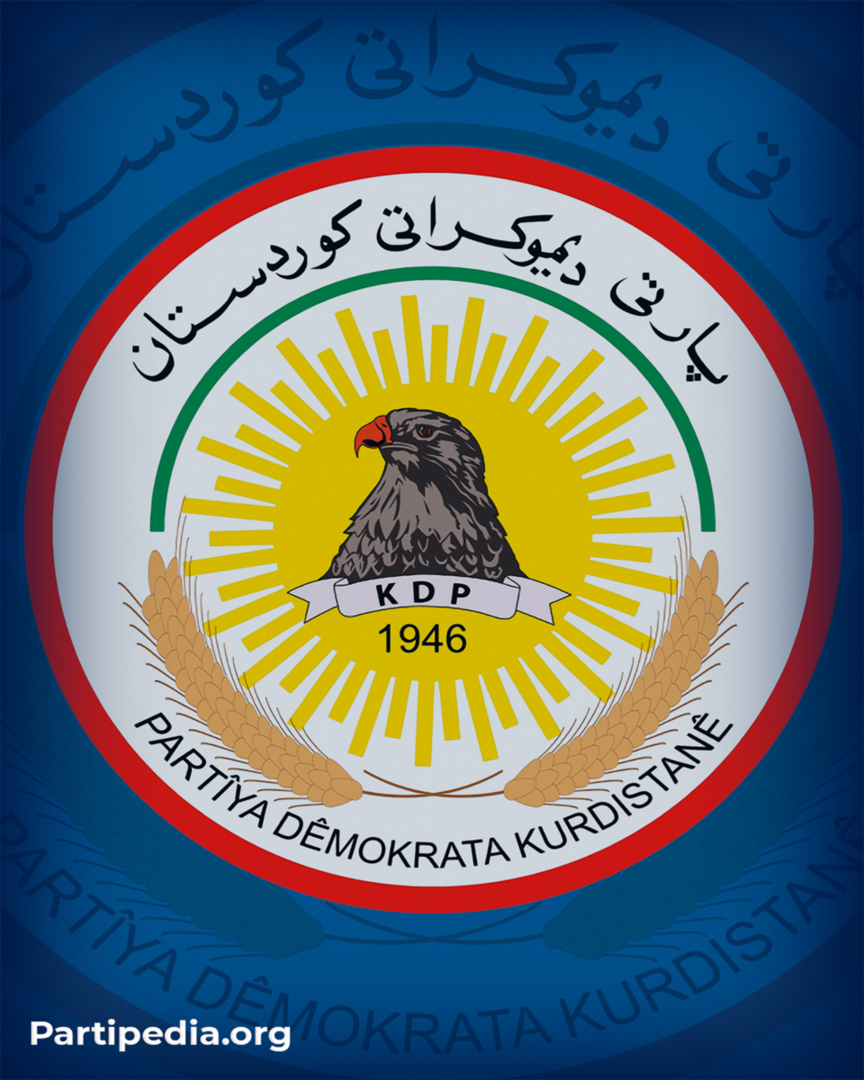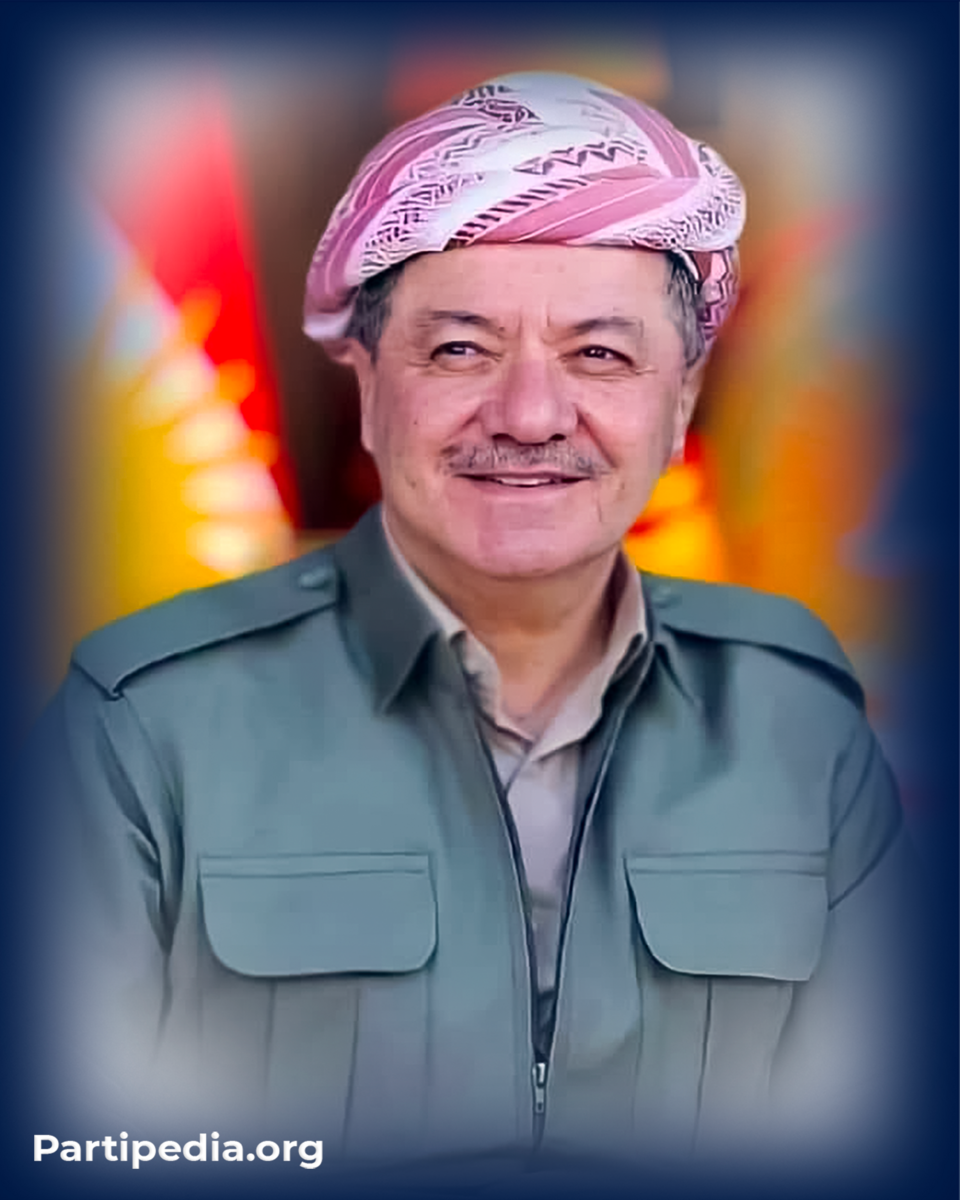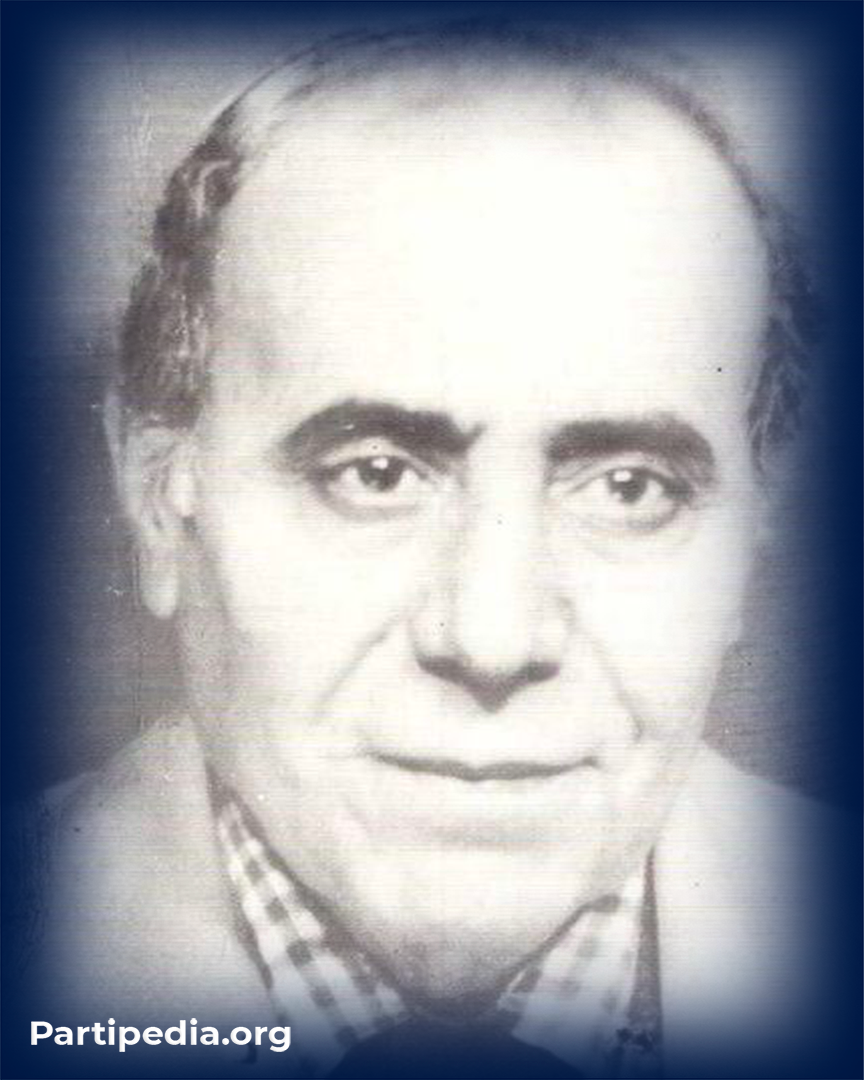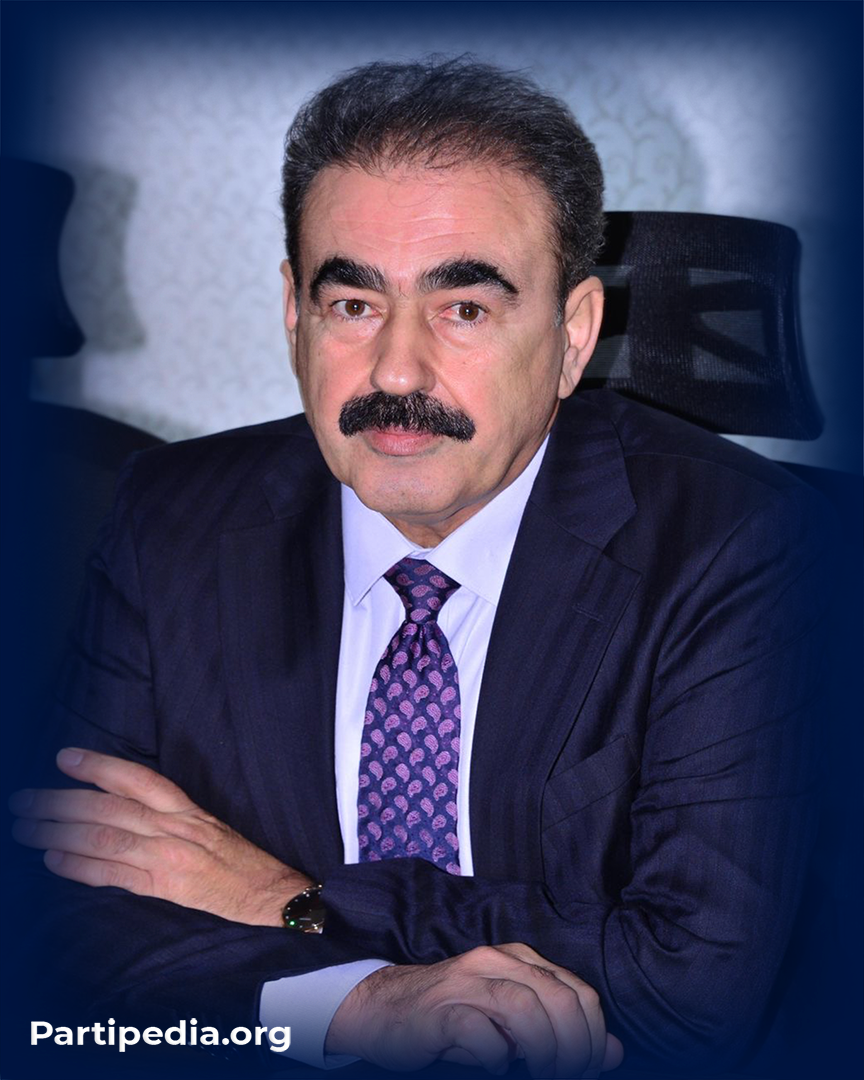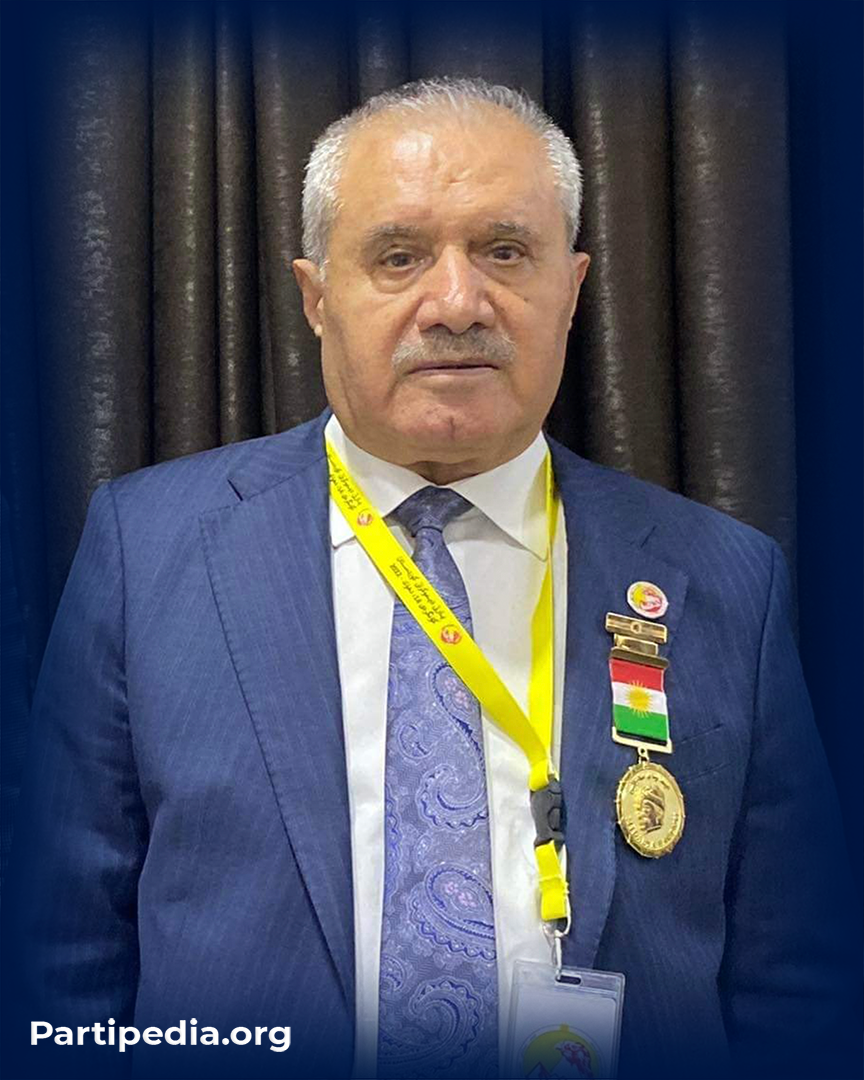Salih Rushdi Tahir joined the Kurdish Democratic Party in Mosul in 1946. In 1950, he was elected by the representatives of the Conference as a member of the Central Committee of the Kurdish Democratic Party (The First Conference of Baghdad). He was frozen in the Second Conference of Baghdad due to being a leftist on June 30, 1959. In 1959, due to being a leftist he was expelled from the ranks of the Kurdistan Democratic Party of Iraq by the representatives of the Fourth Congress.
Biography
Salih Rushdi Tahir, known as Judge Salih Rushdi, was born in Duhok in 1926, from the family of Mufti Amedi, he completed his primary education in Amedi town and his middle and secondary school education in Sulaymaniyah. In 1951 he studied the law school in Baghdad. In 1957 he was appointed as a judge in the Amedi court of Mosul governorate. In 1957, he was a judge in Shaqlawa in the vicinity of Erbil Governorate, he was employed on November 24, 1958 by a decree of the by the Iraqi Sovereign Council as a deputy judge in the civil courts of Iraq.
He was captured by Iraqi security forces from 1963 to 1964،and he was tortured a lot, and after his release in 1964, he left Iraq and settled in Lebanon, where he worked as a teacher. From 1965 to 1990 he lived in the Arabic Kingdom of Saudi Arabia and worked in banking in the capital city of Riyadh. He lived in the United States of America from 1990 to 1999. In 1999, he passed away in the Kansas state of the United States of America and was buried there. He knew Kurdish, Arabic and English.
Memoir of Struggle
In 1944 at the beginning of the Kurdish relief group (Zh.K) campaign, he contacted them in Suleymaniyah and became an active member, in 1945 he became a member of the delegation of Suleymaniyah High School to Baghdad for the purpose of presenting Kurdish songs and dance in the Higher house of teachers of Baghdad and the success club of Kurds and the palace of the Kingdom of Iraq, in 1945, was a member of the Kurdish Relief Group (Zh.K), in 1946 he joined the ranks of the Kurdish Democratic Party in Mosul. On June 19, 1947, he was a member of the delegation to receive the bodies of the four officers: Martyr Ezzat Abdul-Aziz Abdul-Latif (1912-1947), known as Izzat Katani, Mustafa Mustafa Mustafa (1912-1947) known as Mustafa Khoshnaw, Khairulla Abdul-Karim Abdullah (1912-1947) known as Khairulla Gurjizada, and Muhammad Mahmud Muhammad (1922-1947) known as Muhammad Qudsi and went to the funeral of the Martyr Ezzat Abdulaziz in the village of Qulasinjy near the town of Amedy.
In 1948, he was the representative of the Sheran Council of the General Union of Iraqi Students. On 21 January 1948, he participated actively in the demonstration against the Portsmouth Treaty in Baghdad. In 1948 he was the head of the Mosul branch of committee of the Kurdish Democratic Party. In 1950, he was elected as a member of the Central Committee of the Kurdish Democratic Party (The First Conference of Baghdad) by the congress representatives. In 1951, he boycotted the second congress of the Kurdish Democratic Party, and in the summer of 1953, he was imprisoned for the Kurdish patriotism activities by the officials of the Kingdom of Iraq in the prison of the Military Camp of Rashid near Baghdad City. In 1957, he was in the leadership of the first branch committee of the Kurdistan United Democratic Party.
In 1957, he began strengthening the formation of the Kurdistan United Democratic Party in Khoshnawati area, after the coup of the July 14th, 1958; he was one of the petitioners of the Iraqi Democratic National Front for the field political forces. In August 1958, he with the delegation of the Kurdistan United Democratic Party at the reception of Sheikh Ahmed Sheikh Muhammad Sheikh Abdulsalam (1892-1969) known as Sheikh Ahmadi Barzan, who was recently released from Basra prison in southern Iraq, he arrived in Mosul by train to raise the determination of Kurdish people in Mosul he promoted slogans in Arabic and Kurdish for President Mustafa Barzani (1903-1979) which was an important and brave act for this city because the people of this city were dominated by the Arab racism.
On The 10th of January 1959, he was elected as the president of Shaqlawa club, Club, on March 21, 1959, he supervised the Nawroz celebration of Shaqlawa town, and gave a speech to the people in the name of the Kurdistan Democratic Party. On June 19, 1959, in Shaqlawa town representing the Kurdistan Democratic Party he was the manager of the celebration of the four officers martyr Ezzat Abdulaziz Abdullatif (1912-1947) known as Ezzat Katani, Mustafa Mustafa (1912-1947), Mustafa Khoshnaw, Khairulla Abdulkarim Abdullah (1912-1947) known as Khairullah Gurjizada and Muhammad Mahmud Muhammad (1922-1947) known as Muhammad Qudsi, On June 30, 1959, in the second conference in Baghdad his leadership membership was frozen due to being a leftist, in 1959 he was expelled from the ranks of the Kurdistan Democratic Party by the leadership of the Fourth Congress for being a leftist. In 1960 he worked as a judge in the town of Balad in Diyala governorate. After the coup of February 8, 1963, he was captured and extremely torturedby the Arab Baath Party by the National Guard (al-Haras al-Qawmi) in 1963-1964.
His works :
1. Stories and Legends of Kurdish Literature - 1967.
2. The Kurdish revolution.
3. Explanation of the Agrarian Reform Law.
4. Agricultural Relations in the Agrarian Reform Law - 1960.
Sources:
-
ئـ.د.ئـ، فایلی ژماره ٥٤-AJ، مێژووی لێژنهی لقی یهكی پارتی دیموکراتی کوردستان، ل ١.
-
مههدی محهمهد قادر، پێشهاته سیاسییهكانی كوردستانی عێراق ١٩٤٥ ـ ١٩٥٨، (سلێمانی ـ سهنتهری لێكۆڵینهوهی ستراتیجیی كوردستان ـ ٢٠٠٥ز)، ل ل ٦٦، ١٢٨.
-
مصطفی نهریمان، فهرههنگی ئهدیب و نوسهرانی كورد، (بهغدا ـ ئهمێندارێتی گشتی رۆشنبیری ولاوان ـ چاپخانهی ئهسعهد ـ ١٩٨٦ز)، ل ٦٩.
-
جهمال بابان، سلێمانی شاره گهشاوهكهم، بهرگی یهكهم و دووهم، چاپی دووهم، (ههولێر ـ دهزگای چاپ و بڵاوكردنهوهی ئاراس ـ چاپخانهی ئاراس ـ ٢٠١٢ز)، ل ل ٤١٨ ـ ٣١٩.
-
مام جهلال، برایم ئهحمهد سهركردهیهكی بلیمهت و ژیری سهردهمێكی نوێی كوردایهتی، گۆڤاری خاك، ژماره ٥٨، ساڵی پێنجهم، سلێمانی، چاپخانهی ئۆفسێتی دلێر، ١٠ نیسانی ٢٠٠٢ز، ل ل ٦ ـ ٧.
-
مام جهلال، ساڵی كۆنگرهی خوێندكاران، بهشی پێنجهم، گۆڤاری خاك، ژماره ١٤، ساڵی دووهم، سلێمانی، چاپخانهی ئۆفسێتی دلێر، ١٠ ئابی ١٩٩٨ز، ل ٨.
-
مام جهلال، خهبات لهچی یهوههات و چۆن بوو به ئۆرگانی پارتی؟ وچۆن بهرێوه دهچوو؟، گۆڤاری خاك، ژماره ٥٥، ساڵی پێنجهم، سلێمانی، چاپخانهی ئۆفسێتی دلێر، ١٠ كانونی دووهم ٢٠٠٢ز، ل ٥.
-
ئـ.د.ئـ، فایلی ژماره CH-٦٤، دهقی چاوپێكهوتن لهگهڵ دكتۆر وهفا ساڵح ڕوشدی لهلایهن فوئاد ڕهوهند، دهۆك، ١٢ تشرینی یهكهمی ٢٠١٦ز، ل ل ١ ـ ٣.
-
انتخاباتی یانهی شهقڵاوه، گۆڤاری ههتاو، ژماره ١٤٨، ساڵی ٥، ههولێر، چاپخانهی كوردستان، شهمه، ٣١ كانونی دووهمی ١٩٥٩ز، ل ٢٤.
-
عیزهدین مستهفا ڕهسوڵ، بهشێك له یاداشتهكانم، بهرگی یهكهم، (سلێمانی ـ دهزگای چاپ و پهخشی سهردهم ـ چاپخانهی دهزگای حهمدی ـ ٢٠٠٦ز)، ل ١٧٨.
-
جهژنی نهوروز له شهقڵاوه، گۆڤاری ههتاو، ژماره ١٥٣، ساڵی ٥، ههولێر، چاپخانهی كوردستان، چوارشهمه، ١٥ نیسانی ١٩٥٩ز، ل ١٧.
-
فهرهاد عهونی، ٣٦ نامه و چهند كهسایهتییهكهی دیوانی من، (ههولێر ـ چاپخانهی زانكۆی سهڵاحهددین ـ ٢٠١٩ز)، ل ٣١٣.
-
صالح رشدي، الجبهة الوطنیة الدیمقراطیة المتراصة، مجلة شفق، العدد ٩، المجلد ١، كركوك، مطبعة كركوك، تشرین الاول ١٩٥٨م، ص ٥.
-
جهمال بابان، گهشتهكهی قوتابیانی سلێمانی بۆ شاری بهغدا، گۆڤاری سلێمانی، شارهوانی سلێمانی، ژماره ٥١، خولی دووهم، سلێمانی، چاپخانهی دلێر، تشرینی یهكهمی ٢٠٠٤ز، ل ل ١١ ـ ١٢.
-
حبیب محمد كریم، تأریخ الحزب الدیمقراطي الكوردستاني ـ العراق (في محطات رئیسیة) ١٩٤٦ ـ ١٩٩٣، (دهوك ـ مطبعة خهبات ـ ١٩٩٨م)، ص ص ٤٢ ، ٦٠ ـ ٦١.
-
عبدالفتاح علي البوتاني، منطقة بادینان ١٩٢٥ ـ ١٩٧٠ دراسة في الوقائع والتطورات السیاسیة، الجزء الثاني، (أربیل ـ الاكادیمیة الكوردیة ـ ٢٠١٧م)، ص ٤٥٧.
-
عبدالفتاح علي البوتاني، منطقة بادینان ١٩٢٥ ـ ١٩٧٠ دراسة في الوقائع والتطورات السیاسیة، الجزء الأول، (أربیل ـ الاكادیمیة الكوردیة ـ ٢٠١٧م)، ص ٣١٢.
-
لطیف بهرزنجی، نۆزدهی حزیران، گۆڤاری ههتاو، ژماره ١٥٧، ساڵی ٦، ههولێر، چاپخانهی كوردستان، سێشهمه، ٣٠ حوزهیرانی ١٩٥٩ز، ل ل ١٩ ـ ٢٠.
-
مام جلال، مناضل ذو خصال حمیدة وسجایا انسانیة وصفات نادرة وخلق رفیع، صحیفة الاتحاد، الصحیفة المركزیة للاتحاد الوطني الكردستاني، العدد ٣٨٤، السنة الثامنة، السلیمانیة، الجمعة، ٥ آب ٢٠٠٠م، ص ٣.
-
مام جهلال، برایم ئهحمهد سهركردهیهكی بلیمهت و ژێری سهردهمێكی نوی ی كوردایهتی، گۆڤاری خاك، ژماره ٥٨، ساڵی پێنجهم، سلێمانی، چاپخانهی ئۆفسێتی دلێر، ١٠ نیسان ٢٠٠٢ز، ل ٦.
-
مرسوم جمهوري رقم ٥٠٢، جریدة الوقائع العراقیة، وزارة الارشاد في العراق، العدد ١٠٢، السنة الأولی، بغداد، الأربعاء، ٣١ كانون الثاني ١٩٥٨م، ص ٣.
-
موسهدهق توڤی، گۆڤارا رۆناهی، (ههولێر ـ بنكهی ژین بۆ بووژاندنهوهی كهلهپووری بهڵگهنامهیی و ڕۆژنامهوانیی كوردی، چاپخانهی ڕۆژههڵات ـ ٢٠١٤ز)، ل ل ١٣٠ـ ١٣١.




